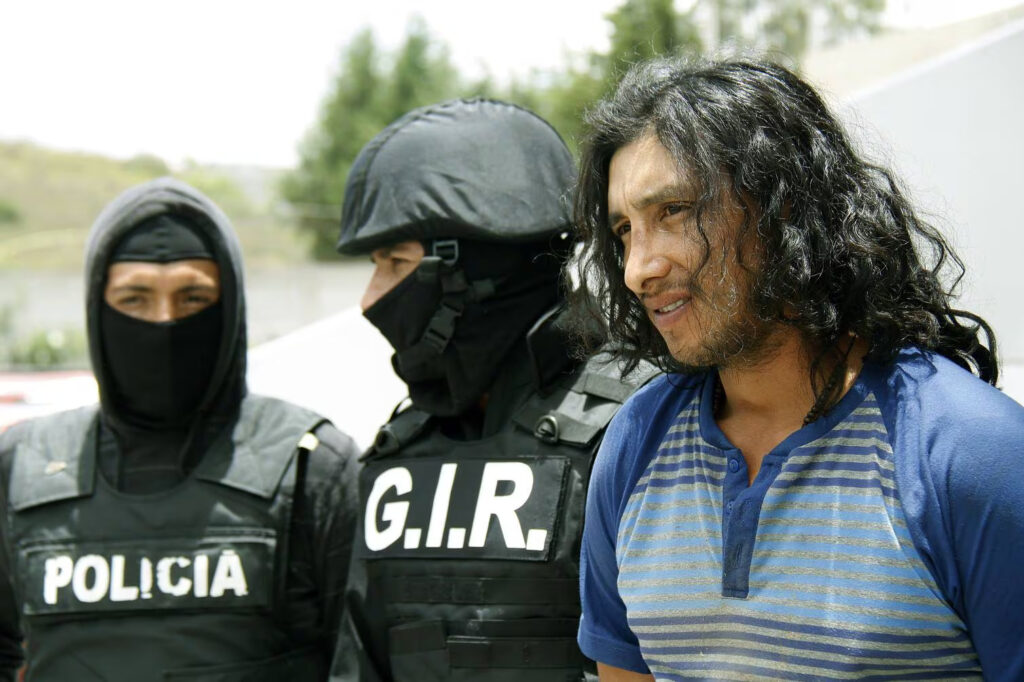In the middle of the live broadcast on the public television station, a man with a handgun first appeared then another man holding a shotgun, then a third man, and more. With the show’s “After the News” title behind them, station employees were brought onto the set and ordered to lie down.
One of the assailants is heard saying. “We are on air, so you know that you cannot play with the mafia,”
There were individuals in masks pointing firearms at press personnel. A voice exclaimed, “Don’t shoot!” About fifteen minutes later, the signal was lost.
The unprecedented assault on the TV station in Guayaquil, a port city in Ecuador, came hours after a series of other attacks and police officer abductions. It also followed the apparent escapes from prison of two of the leaders of the country’s most powerful gangs.
President Declares Internal Armed Conflict in Ecuador
The attack on Tuesday left no one dead, and according to the authorities, the 13 attackers were taken into custody and will face terrorism-related charges. President Daniel Noboa, who came into power in November with a promise to bring peace to the South American country, issued a decree saying the violence-plagued country had entered an “internal armed conflict,” in what some analysts see as a watershed moment for Ecuador.
Late Tuesday, Noboa met with his security Cabinet and, afterward, the head of the Armed Forces Joint Command said the attacks were the gangs’ reactions to the government’s moves against them.
“They have unleashed a wave of violence to frighten the population,” Adm Jaime Vela told journalists, describing the attacks as “unprecedented” in Ecuador’s history.
Although attacks had shaken the South American nation since Monday night, thousands of homes nationwide were able to witness the attack on TV in real-time.
“This is a turning point,” said Will Freeman, a political analyst at the Council on Foreign Relations, adding that while gangs in Ecuador assassinated presidential candidate Fernando Villavicencio and set off car bombs in front of government buildings, Tuesday’s events marked a new peak in violence.
“Depending on how the government responds, it will set the precedent for these kinds of incidents to continue, or it will use this as a catalyst and make some very necessary structural reforms so that the state can start to win its war against crime,” Freeman said.
TC Television’s chief of news, Alina Manrique, was told to get on the ground.
“They aimed the gun at my head,” she told The Associated Press. “I thought about my entire life, about my two children.”
Manrique said that when the attackers realized the police were surrounding them, several of them ran into the studio and attempted to hide.
“I am still in shock,” she said. “Everything has collapsed. All I know is that it’s time to leave this country and go very far away.”
Police officers entered the TV station and subdued the attackers, who can face up to 13 years in prison if they are convicted of terrorism.
On Monday, a day after a notorious gang leader’s apparent escape from prison, President Noboa had declared a national state of emergency, a measure that lets authorities suspend people’s rights and mobilize the military in places like prisons.
On Tuesday, shortly after the gunmen stormed the TV station, Noboa issued another decree designating as terrorist groups 20 drug-trafficking gangs operating in the country, and authorizing Ecuador’s military to “neutralize” them within the bounds of international humanitarian law.
The government has said at least 30 attacks have taken place since authorities announced that Los Choneros gang leader Adolfo Macías, alias Fito, was discovered missing from his cell in a low-security prison Sunday. He was scheduled to be transferred to a maximum security facility that day.
On Tuesday, police in Ecuador announced that Fabricio Colón Pico, the leader of the Los Lobos gang, had escaped from a Riobamba jail. Colón Pico was captured on Friday as part of a kidnapping investigation and has also been accused of trying to murder one of the nation’s lead prosecutors.

Other attacks include an explosion near the house of the president of the National Justice Court and the Monday night kidnappings of four police officers. Police said one officer was abducted in the capital, Quito, and three in Quevedo city.
Authorities say Los Choneros, one of the Ecuadorian gangs considered responsible for a spike in violence mostly tied to drug trafficking, has links with Mexico’s Sinaloa cartel.
Macías’ whereabouts are unknown. Prosecutors opened an investigation and charged two guards in connection with his alleged escape, but neither the police, the corrections system, nor the federal government confirmed whether the prisoner fled the facility or might be hiding in it.
In February 2013, he escaped from a maximum security facility but was recaptured weeks later.
Macías, who was convicted of drug trafficking, murder, and organized crime, was serving a 36-year sentence in La Regional prison in the port of Guayaquil.
